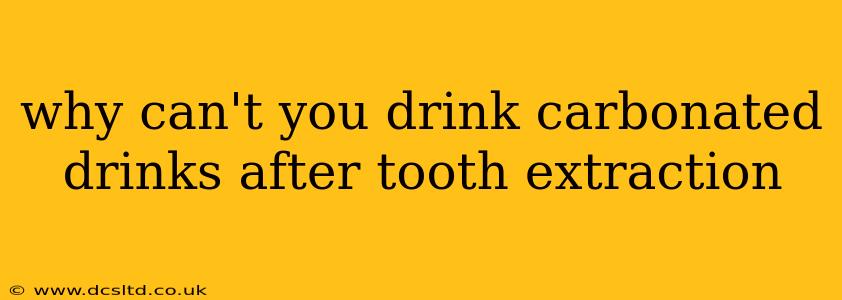Having a tooth pulled is never fun, and the recovery process requires careful attention to detail. One common question many patients have is about carbonated drinks. The short answer is that you shouldn't drink carbonated beverages after a tooth extraction because of the pressure and potential for complications. Let's delve deeper into the reasons why.
Why the Pressure from Carbonation is a Problem?
Carbonated drinks, such as soda, sparkling water, and even some flavored waters, contain dissolved carbon dioxide gas under pressure. When you drink these beverages, the release of these gas bubbles creates pressure within your mouth. This pressure can dislodge the blood clot that forms in the extraction site—a crucial part of the healing process.
This blood clot, called a fibrin clot, acts as a natural bandage, protecting the exposed bone and nerve endings. If it's dislodged prematurely, it can lead to a painful and potentially serious complication known as dry socket.
What is Dry Socket (Alveolar Osteitis)?
Dry socket, or alveolar osteitis, occurs when the blood clot is lost or dissolves before the extraction site has a chance to heal. This exposes the underlying bone and nerve endings, causing excruciating pain, often described as a throbbing, sharp ache. It can also lead to a bad taste or smell in your mouth and even delay healing.
How Does Carbonation Increase the Risk of Dry Socket?
The pressure from carbonated drinks can disrupt the delicate blood clot formation and increase the risk of dry socket. The bubbling action can also irritate the sensitive extraction site, further hindering healing. Even sucking through a straw can create enough suction to dislodge the clot.
What About the Sugar and Acidity in Carbonated Drinks?
Beyond the pressure issue, many carbonated drinks are high in sugar and acidity. Sugar feeds bacteria, potentially increasing the risk of infection at the extraction site. The acidity can also irritate the already sensitive gums and delay healing.
What Can I Drink After a Tooth Extraction?
Instead of carbonated beverages, stick to:
- Water: The best choice for hydration and promoting healing.
- Clear broths: Provide nutrients and fluids without irritation.
- Unsweetened herbal teas: Avoid those with caffeine, which can act as a blood thinner.
- Milk (in moderation): Provides calcium, essential for bone healing.
It's always best to follow your dentist's specific post-operative instructions. They can provide personalized recommendations based on your individual needs and the type of extraction performed.
Can I Drink Carbonated Drinks After the Initial Healing Period?
After the initial healing period (usually about a week, but this varies depending on the individual and the complexity of the extraction), you may be able to gradually reintroduce carbonated drinks. However, it's best to start slowly and monitor your mouth for any signs of discomfort or pain. If you experience any pain or notice any issues, stop drinking them and contact your dentist.
How Long Should I Avoid Carbonated Drinks After a Tooth Extraction?
The recommended timeframe for avoiding carbonated drinks is typically at least one week, but this should be confirmed with your dentist. Individual healing times vary, so always follow your dentist's advice.
Remember, preventing dry socket and promoting optimal healing are paramount after a tooth extraction. By avoiding carbonated drinks and following your dentist's instructions carefully, you'll improve your chances of a smooth and comfortable recovery.
